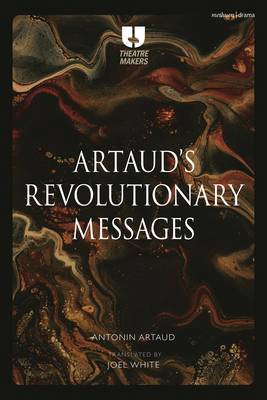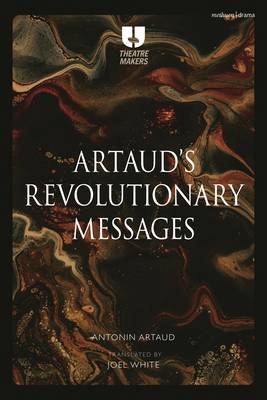
Bedankt voor het vertrouwen het afgelopen jaar! Om jou te bedanken bieden we GRATIS verzending (in België) aan op alles gedurende de hele maand januari.
- Afhalen na 1 uur in een winkel met voorraad
- In januari gratis thuislevering in België
- Ruim aanbod met 7 miljoen producten
Bedankt voor het vertrouwen het afgelopen jaar! Om jou te bedanken bieden we GRATIS verzending (in België) aan op alles gedurende de hele maand januari.
- Afhalen na 1 uur in een winkel met voorraad
- In januari gratis thuislevering in België
- Ruim aanbod met 7 miljoen producten
Zoeken
€ 152,95
+ 305 punten
Uitvoering
Omschrijving
Published here in its entirety in English, Artaud's Revolutionary Messagescollects Antonin Artaud's political, aesthetic and philosophical writings during his travels to Mexico in 1936.
Written around the same time as his seminal work The Theatre and its Double, it captures a crucial point in Artaud's life shortly before he was admitted to a mental asylum in which he was to spend a significant part of his later life.
Revolutionary Messages contains conferences that Artaud gave at the University of Mexico, articles from the daily Mexican newspaper El Nacional Revolucionarioand a study of three seminal artists of the time influenced by or from Mexico: Franz Hals, Ortiz Monasterio and Maria Izquierdo.
Not only will you gain crucial insight into Artaud's time in Mexico and his vision of a "total revolution," which he places in distinction to Marxist and Surrealist conceptions of revolution, but you will deepen your understanding of the philosophical roots of his theatrical project, which ultimately shaped modern theatre and dance.
The publication includes an introduction by the translator, Joel White, and a preface by Professor of European Philosophy, Howard Caygill.
Written around the same time as his seminal work The Theatre and its Double, it captures a crucial point in Artaud's life shortly before he was admitted to a mental asylum in which he was to spend a significant part of his later life.
Revolutionary Messages contains conferences that Artaud gave at the University of Mexico, articles from the daily Mexican newspaper El Nacional Revolucionarioand a study of three seminal artists of the time influenced by or from Mexico: Franz Hals, Ortiz Monasterio and Maria Izquierdo.
Not only will you gain crucial insight into Artaud's time in Mexico and his vision of a "total revolution," which he places in distinction to Marxist and Surrealist conceptions of revolution, but you will deepen your understanding of the philosophical roots of his theatrical project, which ultimately shaped modern theatre and dance.
The publication includes an introduction by the translator, Joel White, and a preface by Professor of European Philosophy, Howard Caygill.
Specificaties
Betrokkenen
- Auteur(s):
- Vertaler(s):
- Uitgeverij:
Inhoud
- Aantal bladzijden:
- 256
- Taal:
- Engels
- Reeks:
Eigenschappen
- Productcode (EAN):
- 9781350179028
- Verschijningsdatum:
- 19/09/2024
- Uitvoering:
- Hardcover
- Formaat:
- Genaaid
- Afmetingen:
- 140 mm x 216 mm
- Gewicht:
- 444 g

Alleen bij Standaard Boekhandel
+ 305 punten op je klantenkaart van Standaard Boekhandel
Beoordelingen
We publiceren alleen reviews die voldoen aan de voorwaarden voor reviews. Bekijk onze voorwaarden voor reviews.









